The High Voltage festival, held in Victoria Park in east London, is now in it’s second year. It’s focus is very much on classic rock, progressive rock and metal. Last years festival, headlined by ZZ Top and ELP was a fantastic weekend. This year’s bill has attracted some criticism for being weaker than last year, but still contained enough great bands to well worth attending.
For some of us at least, the weekend began on Friday with The Reasoning playing a packed Borderline in central London. The slimmed-down five piece incarnation of the band has gelled well now, even though the mix was little vocal-heavy with not quite enough guitar. Their set was an well-chosen selection of songs from their three albums with most of the classics accounted for, plus a couple of excellent sounding brand new numbers from their forthcoming new album, “The Omega Point”, and “No Friend of Mine”, which is apparently all about the pitfalls of social media. I just hope the lyrics are not about me! A great show, which turned out to be the first ever gig by a band I’ve known personally that completely sold out.
High Voltage itself opened on Saturday lunchtime with Von Hertzen Brothers on the Classic Rock Presents Prog stage. Not a band I knew much about. They started off playing melodic hard rock; good, but I wondered what they were doing on the prog stage. But as the set progressed they began playing some more complex material with intricate harmonies that more than justified their inclusion. Tight, energetic and melodic, a good start to the day.
Next up, the much-acclaimed Amplifier, from the more avant-garde end of the genre. The opening moments sounded like The Fall, all atonal noise, but after a few seconds, actual tunes started to appear. Their set was dense and riffy with a lot of atmosphere. By no means bad, but I’m not sure I’ve completely got my head round their music. This lot may take more listening before I really appreciate what they’re doing.
Canterbury scene veterans Caravan represented the opposite end of the spectrum of progressive rock. I wasn’t quite sure what to expect from them, but they far exceeded whatever expectations I had. They played a great jazz-influenced set, keyboard-led with plenty of flute and violin, including the bouncy pop-rock of “Golf Girl”, and ending with the lengthy workout of “Nine Feet Underground” from their seminal album “The Land of the Grey and Pink”. Excellent stuff, and I can’t wait to see them again at the Cambridge Rock Festival.
Liverpool’s Anathema are very much the prog band of the moment. They started off life as a death-metal band, but there’s little or no trace of that now in their atmospheric indie-flavoured prog sound. This is a band who have toiled away for years before getting the recognition they deserved. Their triumphal set, drawn largely from the latest and best album “We’re Here Because We’re Here”, was simply stunning.
Neal Morse turned out to be the revelation of the day. I’ve admired his work with Spock’s Beard, but haven’t investigated his more recent solo work. With an eight-piece band including electric violin and electric cello(!), he played with an incredible level of energy and enthusiasm. The music was a lot like earlier Spock’s Beard, quirky but hugely melodic, with a clear nod to Gentle Giant. The very religious lyrics were a bit hard to take, even for me, but if you focus on the music, it’s amazing and heady stuff, and it was impossible not to be moved by the sheer exuberance of his performance.
I was wondering just how John Lees Barclay James Harvest could follow that. But I needn’t have worried. I’m a late convert to BJH, loving their huge soaring Mellotron-drenched sound. Even without the late Woolly Wolstenholme, and now playing as a four-piece, they’re a great live band. Their distinctive stately symphonic rock culminated in the magnificent epic “The Poet/After the Day”, surely their equivalent of Mostly Autumn’s “Mother Nature”. They closed, as they always do with “Hymn”, which turned into a singalong.
After than it was a quick sprint over to the main stage to catch the hellfire and brimstone of headliners Judas Priest. Amazingly, despite owning a great many of their albums, I’ve never seen this genre-defining band live. Despite their age, the Black Country metal veterans rocked, and even at 60 years old Rob Halford has still got it vocally with those piercing screams. Their greatest hits set drew from right across their 40-year back catalogue, from their very early years to the title track of the most recent opus “Nostradamus”, which Halford sung dressed in a cape and hood. This is a band who really understand the art of showmanship, with Halford whipping the Harley-Davison during “Hell Bent For Leather”. Camper than Millets, but great fun. And what a setlist! Early epics like “Victim of Changes” and “Beyond the Realms of Death”, 80s hit singles like “Breaking the Law”, the controversial “Turbo” and more recent songs like “Judas Rising” from “Angel of Retribution”.
Sunday started with some old-school neo-prog from 80s veterans Pallas, who played an energetic and enthusiastic set, a great warm-up for the day. While much of the set came from their more recent albums I’m not familiar with, they ended with a rousing rendition of “Arrive Alive”.
There is no-one else quite like The Enid, led by keyboard wizard Robert John Godfrey. Not everyone gets what they do, essentially classical music played on rock instrumentation. Supplemented this time by a small choir and a four-piece trumpet section, their set was over far too quickly, ending with the medley of “Land of Hope and Glory” and The Dambusters March, which RJG took pains to suggest was being performed at the request of the promoters. All stirring stuff, and I’m looking forward to seeing them headline the Cambridge Rock Festival.
Curved Air are another band I was looking forward to seeing. Like Caravan, they’re a classic 70s band reformed in recent years, and like them, they’ve still got it decades later. Sonja Kristina was on excellent form vocally, still looking glamorous despite being a grandmother. Apart from their hit “Back Street Luv” and “Vivaldi”, both of which they played, I knew nothing of their back catalogue. They’re very much at the jazzy end of prog with electric violin central to their sound - this is certainly a band I want to see again.
Then it was fingers crossed for Mostly Autumn, for what was a very high profile gig for them. I know I’m a huge fan, and likely to be biased, but it was clear this was something out of the ordinary, even by the high standards of their shows this year. It was one of the performances of their lives. They completely owned the stage, with a mix of energy and emotional intensity that few bands can match. They deserve to pick up a lot of new fans on the strength of performances like that.
Spocks Beard were, for me at least, the sole disappointment of the festival. Maybe it was because I was watching them from further back, maybe it was because they had to follow Mostly Autumn’s stunning performance, maybe having Ted Leonard standing in for the unavailable Nick D’Virgilio on lead vocals sapped their energy. Despite playing a set drawing heavily from their earliest and best albums, they just failed to engage me at all. It all seemed flat – there was none of the jubilant enthusiasm of Neal Morse’s set the day before. I left before the end to catch Black Country Communion on the main stage, so missed Neal’s appearance at the end of the set – maybe that finally brought things to life.
Black Country Communion, on the other hand, absolutely rocked with the sort of performance that’s in danger of giving supergroups a good name. I’d seen Glenn Hughes fronting his own band last year, which was good, and proved his vocal chords are still in good working order. But when he’s sharing the stage with genuine rock stars rather than journeyman musos, BCC are in a completely different league. Joe Bonamassa is the axe hero of his generation, and is the perfect foil for Hughes’ still-superb voice. Jason Bonham is a chip off the old block on drums, and Derek Sherinian added huge depth to the sound on Hammond organ. They ended with an absolutely barnstorming cover of Deep Purple’s “Burn”.
I only caught the last few songs of Jethro Tull, so I can’t really give a thorough appraisal of their set. But I did see rousing renditions of “Aqualung” and “Locomotive Breath” with Joe Bonamassa guesting.
Finally, festival headliners Dream Theater. Even if their brand of intensely muso prog-metal isn’t your cup of tea, every band on the prog stage owes a debt to them. More than any other band, Dream Theater are responsible for putting progressive rock back on the map, and without them many other bands wouldn’t be there. This was a high-stakes gig for them, marking the debut of new drummer Mike Mangini, replacing the much-loved Mike Portnoy.
This is a band who have always been far more about the musicians than the singer. In theatre-sized venues where you can actually see the band members hands, they’re actually quite exciting to watch, fingers flying up and down fretboards. But in a large arena where you can only really see the band on the big screens at the sides of the stage, that effect gets lost. Vocalist James LaBrie was actually on quite good form for once – while he’s never going to be one of my favourite singers, this time his vocals weren’t nearly as bad as I feared they’d be.
While there’s no doubting the band’s amazing technical skills, there was little of the showmanship we’d seen with Judas Priest the night before. The music was great, with a dense complex tapestry of sound. But it clearly didn’t appeal to everyone, and I noticed people were leaving in significant numbers before the end. Still a good performance, but in a weekend that had seen several outstanding ones, by no means the highlight of the weekend.
And so ended the festival. A weekend of amazing music, and a great gathering of the rock tribes. Loved the way I kept bumping into friends all weekend, not just fellow fans but people like Kim Seviour from Touchstone and Ian Jones from Karntaka. Having spent most of the weekend in front of the Classic Rock Presents Prog stage, the sheer quality and variety of the music says it all about why I love progressive rock as a genre. Amplifier are nothing like Mostly Autumn who are nothing like Anathema who are nothing like Neal Morse. Need I go on? Got to an indie festival and all you’ll get a slew of bands drawing from the same limited musical palette, all playing the same predictable chord progressions.
I’m now counting down days until the Cambridge Rock Festival in less than two weeks’ time.
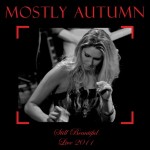 “Still Beautiful” is Mostly Autumn’s third live album in three years. A cynic might accuse them of milking the fanbase with yet another live release, but the success of last year’s “That Night In Leamington” and the two disks of “Live 2009″ does suggest there’s a market for a live document of every tour. This one is significant as it’s the first to feature Olivia Sparnenn as the band’s lead vocalist.
“Still Beautiful” is Mostly Autumn’s third live album in three years. A cynic might accuse them of milking the fanbase with yet another live release, but the success of last year’s “That Night In Leamington” and the two disks of “Live 2009″ does suggest there’s a market for a live document of every tour. This one is significant as it’s the first to feature Olivia Sparnenn as the band’s lead vocalist.

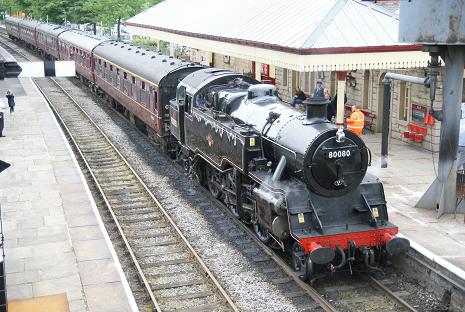
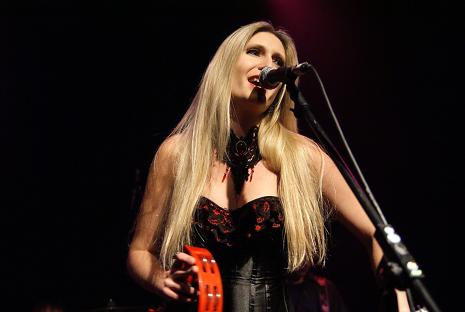
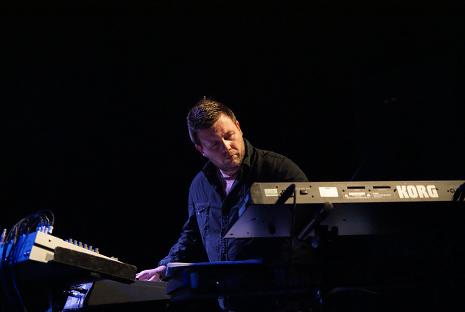
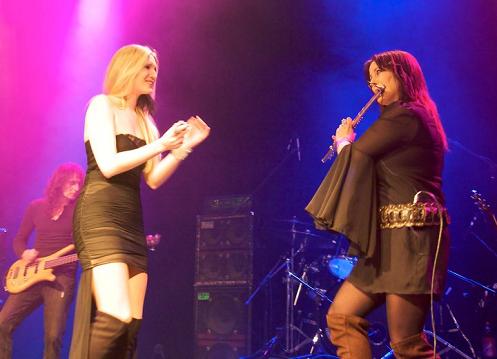 Photo © Howard Rankin
Photo © Howard Rankin